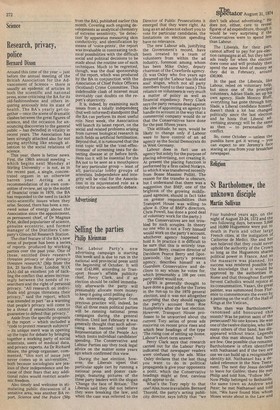Advertising
Selling the parties
Kleinman
The Labour Party's new advertising campaign is starting this week and is due to run in the national and provincial press until the beginning of October. It will cost E142,000, according to Transport House's affable publicity chief, Percy Clark, and if an election should be called immediately afterwards the party will presumably allocate more money to keep it going until polling day.
An interesting departure from previous practice will, indeed, be that all three main political parties will be running national press campaigns during the general election. Until last February it was generally thought that such advertising was banned under the Representation of the People Act which limits individual candidates' spending. The Conservative and Labour Parties say they took legal advice on the matter some years ago which confirmed this view.
During the last election, however, the Liberals upset that particular apple cart by running a national press and poster campaign, featuring pictures of the three party leaders with the slogan 'Change the face of Britain.' The Liberals said they did not believe they were breaking the law, and when the case was referred to the Director of Public Prosecutions it emerged that they were right. As long as an ad does not exhort you to vote for particular candidates, the limitations on election spending have no relevance.
The new Labour ads, justifying the Government's record, have been created by a team of volunteers from within the ad industry, foremost among whom has been Mike Oxley, deputy chairman of the Crawfords agency, (It was Oxley who five years ago dreamed up the 'Labour has life and soul' slogan, which not all party members found to their taste.) This reliance on volunteers is very much a matter of policy as well as financial expediency. Percy Clark says the party remains dead against the idea of appointing an agency to handle its account in the way that a commercial company would do or that the Conservatives have done for the past fifteen years, This attitude, he says, would be likely to change only if Labour were to have control of an ad agency as the Social Democrats do in West Germany.
Labour does in fact use an agency but solely for the purpose of placing advertising, not creating it, At present the placing function is performed by a firm called Notleys, to which it was transferred recently from Boase Massimi Pollitt. The reason for the transfer is obscure, but I understand that there was a suggestion that BMP, one of the brightest of the growing middlesized agencies, should in fact take on greater responsibilities than Transport House was willing to allow it. (One of BMP's directors, Chris Powell, has done a good deal of voluntary work for the party.) The Conservatives are not troubled by such scruples. In theory no one who is not a Tory himself would work on the party's account, whichever agency happened to hold it. In practice it is difficult to be sure that this is entirely true, Norman Berry, creative director of Davidson Pearce Berry and Spottiswoode, the party's present agency, describes himself as a Guardian Conservative and declines to say whom he votes for, which presumably a 100 per cent party zealot would not, DPBS is generally thought to have done a good job for the Tories in the run-up to the 1970 general election, and it was not altogether surprising that they should regain the party's account from Roe Humphreys after the last election. However, Transport House professes to be unworried about the current Tory series of press ads majoring on recent price rises and which pear headings of the type 'The rising cost of setting up home. Labour's short-term answer.'
Percy Clark says that research carried out for the Labour Party indicated that newspaper readers were confused by the ads. Mike Oxley declares that the last thing you want to do in political propaganda is give your opponents a point, which the Conservative headings might at first, careless sight appear to do.
What's the Tory reply to that one? Alas, none is available. Bernard Thorold, the party's acting publicity director, says loftily that "we
Spectator August 31, 1974
don't talk about advertising." He does not, either, care to reveal figures of ad expenditure, though it would be very surprising if the Conservatives were to spend less than Labour.
The Liberals, for their part, cannot afford to pay for pre-election campaigns at all, but they have ads ready for when the election does come and will probably then spend the same kind of money as they did in February, around E30,000.
In the past the Liberals, like Labour, relied on voluntary help, but since one of the principal volunteers, Adrian Slade, set up his own agency, Slade Monico Bluff, everything has gone through him. Slade, a Liberal candidate himself, doesn't think a lot has changed politically since the last election and he hints that Liberal advertising strategy will be the same as then — to personalise the conflict.
So, come October — unless the pundits have got it wrong — You can expect to see Jeremy's face staring at you from your breakfast newspaper.


































 Previous page
Previous page